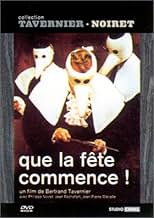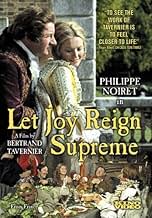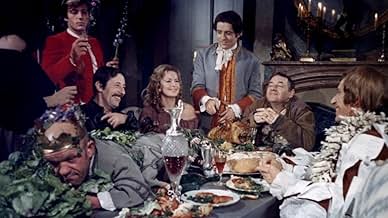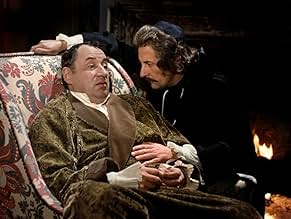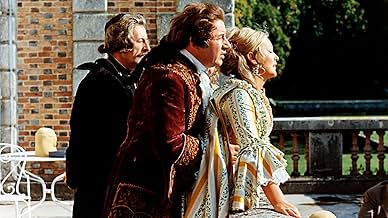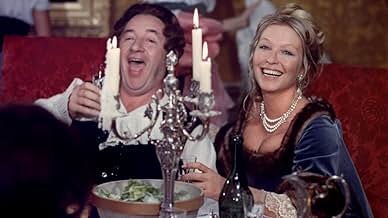Que la fête commence...
- 1975
- Tous publics
- 1h 59min
NOTE IMDb
7,0/10
1,9 k
MA NOTE
Un drame satirique inspiré de la vie de débauche de Philippe d'Orléans, Régent du Royaume de France au XVIIIe siècle, sous le regard complice d'un abbé ambitieux.Un drame satirique inspiré de la vie de débauche de Philippe d'Orléans, Régent du Royaume de France au XVIIIe siècle, sous le regard complice d'un abbé ambitieux.Un drame satirique inspiré de la vie de débauche de Philippe d'Orléans, Régent du Royaume de France au XVIIIe siècle, sous le regard complice d'un abbé ambitieux.
- Réalisation
- Scénario
- Casting principal
- Récompenses
- 5 victoires et 3 nominations au total
Avis à la une
This is one of my all time favorite movie and probably the best historical movie ever. One of the few movies featuring 3 of the best french actors (in leading roles): Philippe Noiret, Jean Richefort and Jean-Pierre Marielle. This movie is about how cynical France was ruled after the death of Louis XIV and while the new (Louis XV) was just a child. Don't expect a spectacular movie with great action and bloody violence (like Gladiator or Brave Heart). The pleasure with this movie is somewhere else: dialogs (brilliant), description of cynicism of the nobility and the actors performances (Jean Rochefort, playing L'Abbé Dubois, stoled the show).
This movie IT'S DEFINITELY NOT "probably the best historical movie ever" or "one of the few movies featuring 3 of the best French actors (in leading roles)",as someone SO WRONGLY says in a review!THESE ARE SIMPLY HUGE NONSENSES!First of all,this movie IT'S NOT AT ALL "probably the best historical movie ever"!To say something like this means that YOU DON'T KNOW ALMOST ANYTHING ABOUT THE HISTORICAL MOVIES!This film is pretty nice,but THERE ARE A LOT OF HISTORICAL MOVIES which are MUCH BETTER and which DEAL WITH MUCH MORE IMPORTANT HISTORICAL THEMES!Then,THIS IS CERTAINLY NOT "one of the few movies featuring 3 of the best French actors (in leading roles)"!THERE ARE A LOT OF OTHER MOVIES featuring 3 OR MORE of the best French actors in leading roles(obviously because such actors WILL ALMOST ALWAYS HAVE THE LEADING ROLES)!So,some people SHOULD REALLY STOP WRITING all kind of BIG NONSENSES like this in here!
This banquet, unlike one of foodstuffs, can be savored again and again to discover its parts. A political tale, a moral tale, an aesthetic breadth that rewards repeated viewing. The casual brutality of the palace: children playing darts against a painting; nobles and servants tossing around a dead rat; and, of course, the walking latrine! As above, so below: brutish soldiers, "shanghai-ers" for the colonies, provincial nobles who live in squalid houses barely above hovels. Noiret, Rochefort, Marielle so perfectly embody their characters; wise yet inconstant Orleans, conscienceless striver Dubois, impetuous, foolish yet gentlemanly Pontcallac. It would be rewarding to view this en suite with Etore Scola's brilliant "La Nuit de Varennes" to bracket the themes.
If you think 2020 is a decadent historical period with dubious morality and opportunist, cynical leaders primarily concerned with satisfying their personal pleasures, then you should try to compare with the year 1719 as presented in the film 'Que la fête commence ...' made in 1975 by Bertrand Tavernier. The English title is 'Let Joy Reign Supreme'.
Louis XIV (the Sun King, 'the state is me', etc.) had died for several years. His great-grandson, the future Louis XV, being a child, the affairs of the state were run by his uncle, the regent Philippe II d'Orleans (played by Philippe Noiret). The rengent was a liberal who had introduced timid political reforms, but also a libertine, an amateur of ever-younger mistresses, procured by his chief adviser, abbot Dubois (Jean Rochefort), a thruster whose main aim was to reach the rank of bishop despite his modest origins. At the royal court and in the palaces of the nobility debauchery, greed and immorality were the norm, and only death, sometimes tragic, sometimes stupid, interrupted the series of parties. The rest of the country mirrored in other shades and colors the same political and moral decay - priesthood was concerned with the excommunication of rats, the small nobility with separatist plots, and the simple people caring for the bread of tomorrow. The story follows the Breton plot led by the picaresque Marquis de Pontcallec (Jean-Pierre Marielle) and the way the higher classes react (or ignore) the growing social fermenting. The seeds of the revolution had been thrown away, but the century was still young and 70 years would pass until the fall of the Bastille.
With this film Bertrand Tavernier approaches a popular and successful genre of French cinema of the 50s and 60s - the cape and sword films, but his heroes are far from being gallant musketeers. The director seems to have not yet mastered the fluidity of the cinematic narrative, very visible in his next films, or he may have been more concerned with the elements of historical satire, the glove-less portrayal of the villains of the time hidden behind their carnival masks, of sarcastic criticism of the decay that rages behind the luxurious decorations and beneath the tables of copious banquets. The historical reconstruction is frothy, with many moments of cynical and extreme humor. Today's viewers who appreciate French cinema and its actors are offered the opportunity to see Philippe Noiret in one of his many notable roles and with Jean Rochefort who camouflages his inborn nobility to embody the role of the Machiavellian abbot who sets in motion political intrigues. The acting revelation, however, is Jean-Pierre Marielle, a lesser-known actor, who builds a memorable character, a kind of late and disturbed Don Quixote, a victim of his own ambitions. The film has a modern look and the 45 years since its creation only contribute to amplifying its effect on the viewers. Paradoxically, or perhaps not, the historical comparison seems even more actual today than it was then.
Louis XIV (the Sun King, 'the state is me', etc.) had died for several years. His great-grandson, the future Louis XV, being a child, the affairs of the state were run by his uncle, the regent Philippe II d'Orleans (played by Philippe Noiret). The rengent was a liberal who had introduced timid political reforms, but also a libertine, an amateur of ever-younger mistresses, procured by his chief adviser, abbot Dubois (Jean Rochefort), a thruster whose main aim was to reach the rank of bishop despite his modest origins. At the royal court and in the palaces of the nobility debauchery, greed and immorality were the norm, and only death, sometimes tragic, sometimes stupid, interrupted the series of parties. The rest of the country mirrored in other shades and colors the same political and moral decay - priesthood was concerned with the excommunication of rats, the small nobility with separatist plots, and the simple people caring for the bread of tomorrow. The story follows the Breton plot led by the picaresque Marquis de Pontcallec (Jean-Pierre Marielle) and the way the higher classes react (or ignore) the growing social fermenting. The seeds of the revolution had been thrown away, but the century was still young and 70 years would pass until the fall of the Bastille.
With this film Bertrand Tavernier approaches a popular and successful genre of French cinema of the 50s and 60s - the cape and sword films, but his heroes are far from being gallant musketeers. The director seems to have not yet mastered the fluidity of the cinematic narrative, very visible in his next films, or he may have been more concerned with the elements of historical satire, the glove-less portrayal of the villains of the time hidden behind their carnival masks, of sarcastic criticism of the decay that rages behind the luxurious decorations and beneath the tables of copious banquets. The historical reconstruction is frothy, with many moments of cynical and extreme humor. Today's viewers who appreciate French cinema and its actors are offered the opportunity to see Philippe Noiret in one of his many notable roles and with Jean Rochefort who camouflages his inborn nobility to embody the role of the Machiavellian abbot who sets in motion political intrigues. The acting revelation, however, is Jean-Pierre Marielle, a lesser-known actor, who builds a memorable character, a kind of late and disturbed Don Quixote, a victim of his own ambitions. The film has a modern look and the 45 years since its creation only contribute to amplifying its effect on the viewers. Paradoxically, or perhaps not, the historical comparison seems even more actual today than it was then.
10kalala
This is a film that has haunted me for thirty years. I just re-viewed it on DVD and it was every bit as good as I remembered. I don't know why it doesn't show up in festivals and best-of-all-times list; it is on mine. It is satisfyingly densely textured and the acting is flawless. It is rich in every way-- historically fascinating as it shows the tugging at the fibers of France that would eventually (but not quite yet) culminate in revolution, the many nuances of class resentment from the top down -- tension between royalty and nobility, generals and (would-be) clergy, and provincial gentry and their peasantry.
Luxurious scenes and costumes and cinematography. Psychologically rich, terrific dialog, in the closely twined relationship between jaded nobility and ambitious bourgeois that plays out in a tug-of-war over the fate of Bretons. Philippe Noiret as the jaded regent is the ambiguous moral center, stoic yet decadent, embodying la patrie yet carving a private erotic niche apart from a world where his decision can tip the balance of European powers.
Luxurious scenes and costumes and cinematography. Psychologically rich, terrific dialog, in the closely twined relationship between jaded nobility and ambitious bourgeois that plays out in a tug-of-war over the fate of Bretons. Philippe Noiret as the jaded regent is the ambiguous moral center, stoic yet decadent, embodying la patrie yet carving a private erotic niche apart from a world where his decision can tip the balance of European powers.
Le saviez-vous
- AnecdotesAgnès Château's debut.
- ConnexionsReferenced in Des Bronzés au Père Noël, la folle histoire du Splendid (2014)
- Bandes originalesGénérique: Forlane / Penthée Acte V)
Composed by Philippe d'Orléans
Meilleurs choix
Connectez-vous pour évaluer et suivre la liste de favoris afin de recevoir des recommandations personnalisées
- How long is Let Joy Reign Supreme?Alimenté par Alexa
Détails
- Date de sortie
- Pays d’origine
- Langues
- Aussi connu sous le nom de
- Que la fete commence
- Lieux de tournage
- Sociétés de production
- Voir plus de crédits d'entreprise sur IMDbPro
- Durée
- 1h 59min(119 min)
- Mixage
- Rapport de forme
- 1.85 : 1
Contribuer à cette page
Suggérer une modification ou ajouter du contenu manquant

![Bande-annonce [OV]](https://m.media-amazon.com/images/M/MV5BYzg1NDE4N2EtN2FiMi00MmEwLTkwM2UtMDNkMDA5Y2ZmODE5XkEyXkFqcGdeQXRyYW5zY29kZS13b3JrZmxvdw@@._V1_QL75_UY281_CR0)
